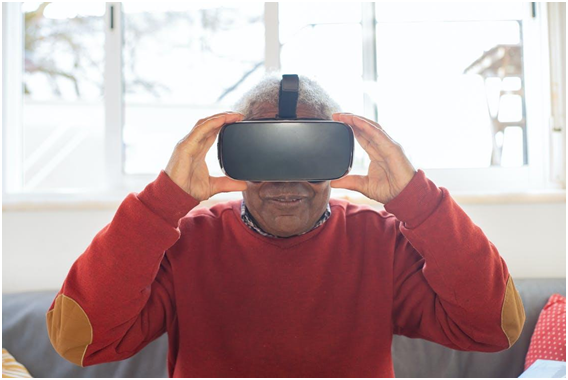Where do you see yourself when you reach the end of your life? This is a question that terrifies me and most likely you. Nobody likes to think about the day they are going to die or getting the news of a terminal illness. We no longer have to live our last days in a hospital bed wishing and dreaming of being elsewhere. Virtual reality (VR) is an avenue to enrichment that can help us reshape palliative care.
The start of virtual reality
In 1984, the concept, virtual reality was invented by Jaron Lanier, founder of VPL Research, to describe augmented computer simulation. Since then, VR has made advancements in video games, business, and most importantly, healthcare. VR has helped doctors and hospitals enhance treatments in rehabilitation, pain management, and mental health. One area of healthcare in which VR has the potential to be life-altering is end-of-life care. This post aims to highlight the importance of VR in healthcare, the positive impact it has already made for some, and the future of the technology for a person’s end-of-life journey. Although MARS VR Lab predominantly focuses on applying VR in pediatrics, I believe there are applications worth exploring for all ages and abilities.
Virtual reality in healthcare
Vitas Healthcare, an end-of-life organization in The United States said VR reduces pain, depression, anxiety, and reliance on medication for many of their patients. Thanks to VR, terminally ill people can be a part of weddings, birthdays, and graduations without leaving their beds. VR gives people the opportunity to experience important family milestones that they would otherwise miss. This means VR has the potential to change the way people live with a terminal illness.
Advances in VR hardware technology will enable creators and clinical teams to build suitable applications for all ages and abilities. The landline took 75 years to develop, whereas now, most cell phone apps are developed within a month. As we advance VR technology, meaningful applications will get to market faster and better. Even though healthcare has traditionally been slow to adopt new technologies, VR has expanded quite quickly and successfully.
As a founder of MARS VR Lab, I have witnessed how healthcare moves slowly, but more importantly, why this is a necessity. Clinical teams carry the burden of long hours, emotional strain, and intense pressure. To ask healthcare professionals to adopt a new way and to abandon familiar processes or tools that already work is a big ask.
Before Shawn (my co-founder) and I started MARS VR Lab, we launched Halifax VR – a family-friendly destination to enjoy catered VR experiences. During this time one woman reached out to ask if we did more than VR parties and events. She was looking for a way to help her dying mother fulfill a lifelong wish of visiting Australia. This is when I knew I wanted to do more than just virtual reality parties and games – I wanted to help people in meaningful ways. Shawn and I were able to fulfill this person’s wish, by creating a memory that I will cherish and never forget.
Living full lives through VR
The future of VR in end-of-life care
My hope is that one day VR will be widely accessible to everyone. Virtual reality will and can be a tool used to provide accessible and enhanced palliative care for those who deserve it most. It’s about helping people, especially those living in their final stage of life.
If you liked what you read, follow Danny on his LinkedIn page to learn more about his work at MARS VR Lab
